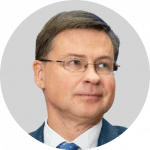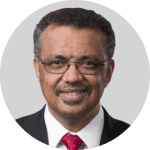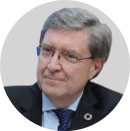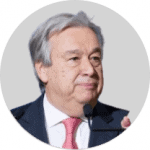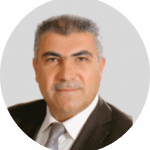Global Solutions Summit May 27-28, 2021
The Global Solutions Summit 2021 took place on May 27-28, 2021.You can watch recordings from all sessions below. The Summit supports the T20 and G20 under the Italian G20 Presidency. It brings together top researchers, policymakers, business leaders and civil society representatives in a renowned global problem-solving process. It focused heavily on a Great Realignment in the post-COVID world, in the spirit of recoupling economic progress with social prosperity and environmental sustainability.
You are currently viewing a placeholder content from Youtube. To access the actual content, click the button below. Please note that doing so will share data with third-party providers.
More InformationThe design problem laid bare – Why recoupling of social and economic prosperity is more urgent than ever
Panelists:Dennis J. Snower, President, Global Solutions Initiative
Colm Kelly, Global Leader, Purpose, Policy and Corporate Responsibility, PwC
Moderator: Declan Curry, Business journalist and conference speaker
You are currently viewing a placeholder content from Youtube. To access the actual content, click the button below. Please note that doing so will share data with third-party providers.
More InformationOpening Address
Panelists:Dennis J. Snower, President, Global Solutions Initiative
Opening Address
Panelists:Dennis J. Snower, President, Global Solutions Initiative
You are currently viewing a placeholder content from Youtube. To access the actual content, click the button below. Please note that doing so will share data with third-party providers.
More InformationOpening with German Federal Chancellor Angela Merkel & Italian Prime Minister Mario Draghi
Panelists:Angela Merkel, German Chancellor
Mario Draghi, Italian Prime Minister and G20 President
Melissa Eddy, Berlin Correspondent, New York Times
German Federal Chancellor Angela Merkel and Italian Prime Minister Mario Draghi will each address the Global Solutions community with an opening keynote and engage in a moderated dialogue.
You are currently viewing a placeholder content from Youtube. To access the actual content, click the button below. Please note that doing so will share data with third-party providers.
More InformationThe Vision for a Recoupled Economy
Keynote:Angel Gurría, Secretary-General, OECD
Panelists:
Colm Kelly, PwC
Colin Mayer, University of Oxford
Erck Rickmers, The New Institute
Ngaire Woods, BSoG
Moderator:
Declan Curry, Business Journalist and Conference Speaker
Our economy should serve human needs. To do so, it must not be entirely geared towards economic progress but has to contribute to social progress and environmental sustainability as well. This is the vision of a recoupled economy: where social, economic and environmental prosperity grow together and not apart.
You are currently viewing a placeholder content from Youtube. To access the actual content, click the button below. Please note that doing so will share data with third-party providers.
More InformationGlobal Challenges – Local Solutions
Panelists: Brianna Kerr, Impact, Kua (YGC Ambassador, Australia)
Ana Rocio, NUUPLab (YGC, Honduras)
Andrea Wehrli, E[co]work (YGC, Switzerland)
Oumaima Bendjama, STEPS (YGC, Algeria)
Moderator:
Katie Gallus, Moderator
Young Global Changers
Young Global Changers from four different parts of the world present their projects, each contributing to the aim of Recoupling in a different way, providing local solutions for some of the most severe challenges we are facing today.
You are currently viewing a placeholder content from Youtube. To access the actual content, click the button below. Please note that doing so will share data with third-party providers.
More InformationThe Great Realignment for a Better Future
Panelists: Keryn James, Environmental Resources Management (ERM)Paolo Magri, Institute for International Political Studies (ISPI); T20 Italy
Robert E. Moritz, PwC International
Dennis J. Snower, Global Solutions Initiative
Moderator: Declan Curry, Business journalist and conference speaker
You are currently viewing a placeholder content from Youtube. To access the actual content, click the button below. Please note that doing so will share data with third-party providers.
More InformationThe New Trade Governance Agenda
Keynote:Valdis Dombrovskis, Executive Vice President, European Commission
Panelists:
Gabriel Felbermayr, IfW Kiel
Beata Javorcik, University of Oxford
Pascal Lamy, Chair, Paris Peace Forum
Pier Carlo Padoan, Istituto Affari Internazionali
Moderator: Katie Gallus, Moderator
TF 3 – Trade, Investment and Growth
Our global rulebook of trade is outdated. It does not accommodate geopolitical power shifts, it is unfit to cope with the rapid internationalization of state-owned enterprises, and it cannot capture the changes which digitalization has introduced to goods and services.
You are currently viewing a placeholder content from Youtube. To access the actual content, click the button below. Please note that doing so will share data with third-party providers.
More InformationLeveling up to tackle regional disparities
Keynote: Enrico Giovannini, Minister of Infrastructure and Sustainable Mobility, ItalyPanelists: Paul Collier, University of Oxford
Albert Ting, Lawrence S. Ting Memorial Foundation
Luca Trifone, Rome Mayor’s Office
Moderator: Nicolas Buchoud, President, Grand Paris Alliance for Metropolitan Development
Beyond the „global cities and infrastructure for growth“ narrative that has largely prevailed since the aftermath of the Cold War, this session will reflect on how key policy-making arenas such as the G20 can help reverse urbanization’s extraordinary ability to cement and lock-in an unsustainable, unequal future.
You are currently viewing a placeholder content from Youtube. To access the actual content, click the button below. Please note that doing so will share data with third-party providers.
More InformationTowards a Strong G20 for Effective Multilateral Cooperation
Interview: Olaf Scholz, Minister of Finance, GermanyPanelists: Samir Saran, Observer Research
Mette Grolleman, FleishmanHillard
Dennis J. Snower, President, GSI
Mo Ibrahim, Founder and Chair, Mo Ibrahim Foundation
Moderator: Ali Aslan, TV Presenter & Journalist
The G20 is an important actor for transformational change. It can supply top-level political impetus to global agreements and commitments. It can set norms as how policies should be designed. And it can initiate policies through concrete commitments.
You are currently viewing a placeholder content from Youtube. To access the actual content, click the button below. Please note that doing so will share data with third-party providers.
More InformationG20 Sherpas: towards global realignment
Panelists:Lars Hendrik Röller, Germany
Svetlana Lukash, Russia
Suresh Prabhu, India
Trudi Makhaya, South Africa
Nicolas Pinaud, OECD
Moderator:
Uwe Jean Heuser, Journalist, DIE ZEIT, Germany
The Italian G20 Presidency comes at a critical time in the history of the G20. Collective action across the G20 and beyond is required to promote recovery from the Covid-19 pandemic, both in terms of global health and economic prosperity. Furthermore, this recovery needs to environmentally sustainable and socially inclusive.
You are currently viewing a placeholder content from Youtube. To access the actual content, click the button below. Please note that doing so will share data with third-party providers.
More InformationThe Road to G20 Indonesia
Keynote:Sri Mulyani Indrawati, Indonesian Minister of Finance
Prospects for social and economic prosperity
Keynote by Sri Mulyani Indrawati, Indonesian Minister of Finance
You are currently viewing a placeholder content from Youtube. To access the actual content, click the button below. Please note that doing so will share data with third-party providers.
More InformationThe International Financial System in Distress
Panelists:Alicia García-Herrero, Bruegel
Claude Lopez, Milken Institute
Akshay Mathur, ORF Mumbai
Jose Siaba Serrate, CARI
Mehmet Şimşek, Dome Group, Former Deputy Prime Minister of Turkey
Moderator:
Franco Bruni, ISPI
T20 TF 9 – International Finance
Debt levels have risen strongly. Especially in low- and middle-income countries this presents a serious problem, which the global community has to address systematically and urgently in order to safeguard financial stability.
You are currently viewing a placeholder content from Youtube. To access the actual content, click the button below. Please note that doing so will share data with third-party providers.
More InformationInfrastructure: Targets, Governance and Financing
Keynote:Tetsushi Sonobe, ADBI
Panelists: Arun Maira, HelpAge International
Riatu Mariatul Qibthiyyah, UoI
Francesco Profumo, Fondazione Compagnia di San Paolo
Moderator: Nicolas Buchoud, GSI Fellow & President, Grand Paris Alliance for Metropolitan Development
T20 TF 7 – Infrastructure Investment and Financing
Infrastructure plays a key role in supporting the recoupling of economic prosperity with social and environmental prosperity. This requires long-term investment in social infrastructure, including education, health and housing, as well as investments into infrastructure that supports a reduction of the environmental footprints.
You are currently viewing a placeholder content from Vimeo. To access the actual content, click the button below. Please note that doing so will share data with third-party providers.
More InformationHow to Fix Our Institutions
Panelists:Julia Pomares, Government of the City of Buenos Aires
Dennis J. Snower, President, GSI
Moderator:
Blair Sheppard, PwC
Events of the last few years have demonstrated that society’s institutions are in dire shape. Fixing these institutions, from the ground up, is critical; without them, our societies fail to uphold their most basic duties to their citizens.
You are currently viewing a placeholder content from Youtube. To access the actual content, click the button below. Please note that doing so will share data with third-party providers.
More InformationChina-West Relations and the Global Order
Panelists:Sergio Bitar, IIDEA
Kerry Brown, King’s College London
Susan Thornton, Yale University
Dongxiao Chen, Shanghai Institutes for International Studies
Moderator:
Colin Bradford, Brookings Institution
In the context of 2021 in which conflicting narratives continue to prevail in US-China bilateral relations making geopolitical tensions the dominant force in the global order, setting the stage for systemic competition between autocracy and democracy, there is an urgent need for alternative narratives.
You are currently viewing a placeholder content from Vimeo. To access the actual content, click the button below. Please note that doing so will share data with third-party providers.
More InformationStrengthen Global Governance & Ease Geopolitical Tensions
Panelists:Kevin Rudd, Former Prime Minister, Australia and President of the Asia Society
Paul Martin, Former Prime Minister, Canada and Founding Chair of the G20 Finance Minsters Group
Moderator:
Colin Bradford, Lead-Co-Chair of the China-West Dialogue
This session will put forward a set of ideas which are specific, practical, feasible and credible to create a “new political dynamic” that can strengthen global governance by energizing and reforming the G20 as a platform for political leadership, rather than talking over the heads of people.
You are currently viewing a placeholder content from Youtube. To access the actual content, click the button below. Please note that doing so will share data with third-party providers.
More InformationMulti-level Governance to Solve Global Problems
Panelists:Amitai Etzioni, GWU
Amrita Narlikar, GIGA
Giampiero Massolo, ISPI
David Sloan Wilson, Binghamton University
Moderator:
Melissa Eddy, Berlin Correspondent, New York Times
T20 TF 8 – Multilateralism and Global Governance
The key to the future of multilateralism lies in recognizing how various levels of governance, local identity, nationalism and multilateralism, can complement one another so that global problem-solving goes hand in hand with empowerment and social prosperity.
You are currently viewing a placeholder content from Youtube. To access the actual content, click the button below. Please note that doing so will share data with third-party providers.
More InformationThe Policy Implications of Geoeconomic Strategies
Panelists:Holger Görg, Kiel Institute for the World Economy
Katrin Kamin, IfW Kiel
Abraham L. Newman, Georgetown University
Guntram Wolff, Bruegel
Moderator:
Declan Curry, Business Journalist and Conference Speaker
Kiel Institute for the World Economy
The increased use of geoeconomic instruments by global trading partners call for a reorientation of foreign policy and, in particular, trade policy actions. This session will outline the challenges posed by the use of geoeconomic instruments, and discuss strategic implications for the EU, other trading blocs and the G20.
You are currently viewing a placeholder content from Youtube. To access the actual content, click the button below. Please note that doing so will share data with third-party providers.
More InformationProtecting Climate and Biodiversity
Keynote: Svenja Schulze, German Federal Minister for the Environment, Nature Conservation and Nuclear SafetyPanelists: Venkatachalam Anbumozhi, Economic Research Institute for ASEAN
Ruth Delzeit, Basel University
Rodolfo Lacy, OECD
Johan Swinnen, International Food Policy Research Institute; Co-Chair of TF2
Moderator: Luiz de Mello, T20 TF2
T20 TF 2 – Climate Change, Sustainable Energy & Environment
“Biodiversity loss and ecosystem degradation are currently among the top threats facing humanity.” This is how last year’s UN Summit on Biodiversity describes the urgency of stopping biodiversity loss, noting the detrimental impact on food security, water supplies and also human health.
You are currently viewing a placeholder content from Youtube. To access the actual content, click the button below. Please note that doing so will share data with third-party providers.
More InformationCarbon Pricing on a Global Level
Panelists:Anthony Cox, Deputy Director, Environment, OECD
John Weyant, Stanford University
Zhang Xiliang, Tsinghua University
Moderator: Conny Czymoch, International Moderator & Journalist
Co-Moderator: Sonja Peterson, Kiel Institute for the World Economy
Kiel Institute for the World Economy
To reach the temperature targets of the Paris-Agreement, the global economy needs to quickly move towards net-zero emissions and major economies including the EU, the US and China have committed themselves to such ambitious targets.
You are currently viewing a placeholder content from Youtube. To access the actual content, click the button below. Please note that doing so will share data with third-party providers.
More InformationCircular Economy in Emerging Countries
Keynote: Izabella Teixeira, Co-Chair, UNEP International Resource PanelPanelists: Shardul Agrawala, OECD
Linda Arthur, ADBI
Medrilzam, Bappenas
Helga Vanthournout, WFC
Moderator: Nicolas Buchoud, GSI Fellow & President, Grand Paris Alliance for Metropolitan Development
GIZ
The challenges of turning the idea of a circular economy into reality are multifaceted. What needs to be done to close the knowledge gaps in the identification of sustainable production and consumption loops to make circularity the mainstream model in emerging economies?
You are currently viewing a placeholder content from Vimeo. To access the actual content, click the button below. Please note that doing so will share data with third-party providers.
More InformationActions Needed to Realise the Net Zero Transition
Panelists:Emma Cox, PwC
John Kirton, University of Toronto
Nigel Topping, COP26
Moderator:
Declan Curry, Business Journalist and Conference Speaker
Across the G20 economies, progress on decarbonisation is not fast enough. The upcoming COP26 is a chance for global leaders to move quickly from ambition to action on net zero. What are the key actions needed by businesses to underpin the transition to net zero?
You are currently viewing a placeholder content from Youtube. To access the actual content, click the button below. Please note that doing so will share data with third-party providers.
More InformationLocalising the Circular Economy Imperative
Panelists:Alexander Bonde, German Federal Environmental Foundation
Mohammed Khashashneh, Ministry of Environment of Jordan
Shuva Raha, Environment and Water
Shereen Shaheen, The Coca Cola Company
Moderator: Alexander Charalambous, Living Prospects
GIZ
Localising the circular economy would help concretely address challenging environmental, economic, and also social trends and challenges. Building on the immense potential for social and environmental technology innovation in urban areas, circularity can induce deep systemic changes in the economy and contribute to increased resilience in supply chains.
You are currently viewing a placeholder content from Youtube. To access the actual content, click the button below. Please note that doing so will share data with third-party providers.
More InformationImplementers‘ Forum: Circular Economy
Keynote:Alexander Bonde, DBU
Panelists:
Ina Budde, circular.fashion
Timothy Glaz, Werner & Mertz
Markus Lücke, GIZ
Christian Schiller, cirplus
Moderator:
Alexander Charalambous, Living Prospects
DBU supported by GIZ (by invitation only)
Many companies and innovators worldwide already develop and successfully implement circular economy solutions. However, mainstreaming circular economy principles is hampered by institutions and policy settings that privilege linear “make-use-dispose” business models. During this Implementers’ Forum, participants will present their circular economy initiatives.
You are currently viewing a placeholder content from Youtube. To access the actual content, click the button below. Please note that doing so will share data with third-party providers.
More InformationHow fair is the global access to vaccines?
Panelists:
António Guterres, Secretary-General, United Nations
Martin Schulz, President, Friedrich Ebert Foundation
Moderator:
Anna Sauerbrey, Journalist, Der Tagesspiegel, Germany
Friedrich Ebert Stiftung
Antonio Guterres, Secretary-General, UN and Martin Schulz, President, Friedrich Ebert Foundation discussing the pandemic as a global problem, addressing global vaccine strategy and its fairness throughout the world.
You are currently viewing a placeholder content from Youtube. To access the actual content, click the button below. Please note that doing so will share data with third-party providers.
More InformationPandemic Preparedness as a Global Challenge
Keynote:Michael Kremer, University of Chicago, Nobel Laureate 2019
T20 TF 1 – Global Health and Covid-19
Pandemic preparedness is not only important to cope with health emergencies but also necessary to prevent social emergencies around the globe. Especially for low-income countries, this is difficult to achieve.
You are currently viewing a placeholder content from Youtube. To access the actual content, click the button below. Please note that doing so will share data with third-party providers.
More InformationPandemic Preparedness as a Global Challenge
Keynote:Jens Spahn, German Federal Minister of Health
Panelists:
Paola Testori Coggi, Lead Co-Chair T20
Michael Kremer, UoC, Nobel Laureate 2019
Gabriela Ramos, UNESCO
Axel Radlach Pries, President, WHS
Moderator: Ali Aslan, International TV Presenter and Journalist
T20 TF 1 – Global Health and Covid-19
Pandemic preparedness is not only important to cope with health emergencies but also necessary to prevent social emergencies around the globe. Especially for low-income countries, this is difficult to achieve.
You are currently viewing a placeholder content from Youtube. To access the actual content, click the button below. Please note that doing so will share data with third-party providers.
More InformationManaging Migration Jointly with Countries of Origin and Transit
Interview:Margaritis Schinas, Vice-President for Promoting our European Way of Life, EU Commission
Comment:
Olivia Sundberg Diez, European Policy Centre
Moderator: Matina Stevis-Gridneff, Brussels Correspondent, New York Times
Mercator Dialogue on Asylum and Migration
Equal and mutually beneficial partnerships are essential to managing migration sustainably. The European Commission’s New Pact on Migration and Asylum paves the way for a new level of international cooperation.
You are currently viewing a placeholder content from Youtube. To access the actual content, click the button below. Please note that doing so will share data with third-party providers.
More InformationEU-Turkey Cooperation on Migration
Panelists:
Asli Aydıntaşbaş, European Council on Foreign Relations
Angeliki Dimitriadi, ELIAMEP
Martin Ruhs, Deputy Director, Migration Policy Centre, European University Institute
Moderator:
Matina Stevis-Gridneff, New York Times
Mercator Dialogue on Asylum and Migration
Five years after the EU-Turkey Statement, the EU and Turkey are now negotiating their future migration cooperation. Voters’ policy preferences should be taken into account to make such cooperation sustainable.
You are currently viewing a placeholder content from Youtube. To access the actual content, click the button below. Please note that doing so will share data with third-party providers.
More InformationGlobal Challenges to Migration after COVID-19
Panelists:Emma Bonino, Senator, Rome, Co-Chair T20 TF10 – Migration
Ottilia Anna Maunganidze, Institute for Security Studies
Moderator:
Asli Selin Okyay, Istituto Affari Internazionali (IAI)
T20 TF 10 – Migration
The pandemic has greatly affected the lives of migrants and refugees. Countries of origin, transit, and destination face multiple policy challenges. How can the economic and social benefits of migration be developed for inclusive recovery in a post-Covid context?
You are currently viewing a placeholder content from Youtube. To access the actual content, click the button below. Please note that doing so will share data with third-party providers.
More InformationA Global Vaccine Strategy
Panelists:
Stefano Vella, Global Health, Catholic University, Rome
José Manuel Barroso, Chair GAVI Board
Moderator:
Anna Sauerbrey, Der Tagesspiegel, Germany
Friedrich-Ebert-Stiftung
While the debate about COVID-19 in the European Union has focused heavily on local and regional vaccine distribution, an essential key to winning the fight against the pandemic has been overlooked: we need a global vaccination strategy and global equitable access to a vaccine.
You are currently viewing a placeholder content from Youtube. To access the actual content, click the button below. Please note that doing so will share data with third-party providers.
More InformationWhy We Need a Global Pandemic Treaty
Keynotes:Tedros Adhanom Ghebreyesus, WHO
Panelists:
Catharina Boehme, WHO
Gabriela Bucher, Oxfam International
Frank Tressler Zamorano, UN
Olive Shisana, Evidence Based Solutions
Moderator: Ilona Kickbusch, WHS
World Health Summit
In March 2021 a group of heads of government from around the world called for a global pandemic treaty. This idea had been initially proposed by the President of the European Council and fully supported by the Director-General of the WHO. This session will discuss what such a treaty hopes to achieve and what political processes are necessary to improve pandemic preparedness and response.
You are currently viewing a placeholder content from Vimeo. To access the actual content, click the button below. Please note that doing so will share data with third-party providers.
More InformationImplementing Good Health and Wellbeing
Panelists:James Sanderson, NHS England
Roland Schatz, UNGSII Foundation
Päivi Sillanaukee, Ministry of Foreign Affairs, Finnland
Moderator:
Gareth Presch, WHI Summit
World Health Innovation Summit
The current healthcare systems tend to be based predominantly on a sick-care model, the system is essentially one that waits until we have fallen ill. We face unprecedented challenges with global staff shortages predicted to be 18m by 2030 (BMJ).
You are currently viewing a placeholder content from Youtube. To access the actual content, click the button below. Please note that doing so will share data with third-party providers.
More InformationWomen’s economic empowerment and the SDGs
Keynote: Rebeca Grynspan, SEGIBPanelists: Renana Jhabvala, Self-Employed Women’s Association
Marieme Esther Dassanou, Affirmative Finance Action for Women in Africa, AfDB
Simona Scarpaleggia, Edge Strategy
Luis Guillermo Solis, Florida International University
Moderator: Margo Thomas, WEI
Women’s Economic Imperative
Despite progress achieved in recent years, the COVID-19 pandemic poses a threat for gender equality, as it has deepened pre-existing inequalities and structural barriers that limit equal access and distribution of opportunities in the marketplace (unemployment, low wages, vulnerable jobs), as well as at home (burden of unpaid care work, violence against women).
You are currently viewing a placeholder content from Vimeo. To access the actual content, click the button below. Please note that doing so will share data with third-party providers.
More InformationBuilding a Better Future of Work
Panelists:
Ramiro Albrieu, CIPPEC
Vesselina Ratcheva, World Economic Forum
Bhushan Sethi, PwC US
Emma Zang, Yale University
Moderator:
Carolin Roth, CNBC
G20 governments and business leaders, should help shape sustainable and inclusive societies in a post-COVID-19 world including through incentivising skilling programs that prepare workforces for a digital future as well as reimagining the concept of good jobs in growing sectors.
You are currently viewing a placeholder content from Youtube. To access the actual content, click the button below. Please note that doing so will share data with third-party providers.
More InformationThe Future of Welfare States
Panelists:Tito Boeri, T20, Bocconi University
Marc Fleurbaey, Paris School of Economics
Richard Samans, International Labour Organization
Margo Thomas, Women’s Economic Imperative
Moderator:
Evan Davis, BBC2 show, Newsnight
T20 TF 6 – Social Cohesion and the Future of Welfare Systems
In addition to providing short-term proposals to tackle the most urgent challenges around social cohesion posed by the pandemic, this panel will discuss medium-to-long term policy options to ensure that the post-COVID economic recovery will be based on the principles of equality, fairness and inter-generational solidarity.
You are currently viewing a placeholder content from Youtube. To access the actual content, click the button below. Please note that doing so will share data with third-party providers.
More InformationReducing Inequalities and Vulnerabilities in a Post-Pandemic World
Panelists: Michelle Muschett, Senior Policy Leader, Oxford Poverty and Human Development Initiative, University of OxfordBrian Nolan, Oxford Martin School
Steven Durlauf, University of Chicago
Irene Natividad, GlobeWomen Research & Education Institute
Moderator: Sebastian Schwark, FleishmanHillard
The Covid-19 pandemic has put the spotlight on inequalities and vulnerabilities in our societies. Infection rates and risks, deaths, income losses, educational deficits resulting from school closures, and many more – all these consequences from the pandemic were distributed very unequally across societies.
You are currently viewing a placeholder content from Youtube. To access the actual content, click the button below. Please note that doing so will share data with third-party providers.
More InformationBuilding Sustainable Economies by Getting Youth into Work
Panelists:Kate Behncken, Microsoft Philanthropies
Bethan Grillo, Global Purpose and Corporate Responsibility, PwC
Mamta Murthi, Human Development, WB
Taha Bawa, Goodwall
Jerome Ochieng, Kenyan Ministry of ICT, Innovation and Youth Affairs
Moderator: Kevin Frey, Generation Unlimited
Youth are among those who have often been locked out of the benefits of the economic system, and COVID has exacerbated this. ILO estimated that 8.7% more young people withdrew from the workforce in 2020 than would have done otherwise. The world faces an urgent need to focus on (re)skilling youth and connect them to employment and entrepreneurial opportunities.
You are currently viewing a placeholder content from Youtube. To access the actual content, click the button below. Please note that doing so will share data with third-party providers.
More InformationHealth Investments for Social and Economic Prosperity
Panelists:Alan Donnelly, The G20 Health & Development Partnership
Indranil Bagchi, Novartis
Rifat Atun, Harvard University
Francesca Colombo, OECD
Moderator:
Nadine Dusberger, FleishmanHillard Germany
Novartis
Economic prosperity is intrinsically dependent on public health. Investments in healthcare and R&D, as well as in other social and health-promoting priorities such as housing, education or nutrition, have a direct impact on economic prosperity.
You are currently viewing a placeholder content from Youtube. To access the actual content, click the button below. Please note that doing so will share data with third-party providers.
More InformationWomen’s economic empowerment and pandemic recovery
Keynotes: Justine Greening, Social Mobility PledgeCaren Grown, World Bank
Linda Scott, Oxford University
Vera Songwe, Economic Commission for Africa; Under Secretary-General, UN
Elizabeth Vasquez, WEConnect International
Moderator: Amadou Mahtar Ba, AllAfrica
Women’s Economic Imperative
Building on the work of the UN Secretary General’s High-Level Panel on Women’s Economic Empowerment, we discuss the importance of gender economic equity across the SDGs, recognizing the economic and social impacts of COVID-19 and the critical role of women and girls for pandemic response, recovery and resilience.
You are currently viewing a placeholder content from Youtube. To access the actual content, click the button below. Please note that doing so will share data with third-party providers.
More InformationFinancing the SDGs in the aftermath of the Pandemic
Keynote:Paolo Gentiloni, Commissioner for Economy, European Commission
Panelists: Vera Songwe, UN ECA
Homi Kharas, T20, Brookings Institution
Stefano Manservisi, T20, IAI
Muriel Pénicaud, OECD
Moderator: Carolin Roth, Journalist and moderator
T20 TF 5 – 2030 Agenda and Development Cooperation
Achieving the SDGs has become even harder amid the pandemic. COVID-19 has eradicated past achievements and made financial resources much scarcer. Covid measures have led to rising debt levels around the world, impeding the fight against poverty, the long-term strengthening of health systems and SDG achievement.
You are currently viewing a placeholder content from Vimeo. To access the actual content, click the button below. Please note that doing so will share data with third-party providers.
More InformationHow companies can measure social and environmental progress
Keynote:Mairead McGuinness, EU Commission
Panelists:
Ulrik Vestergaard Knudsen, OECD
Paul Penepent, Novartis
Ulrich Störk, PwC Germany
Moderator:
Christian Heller, Value Balancing Alliance
value balancing alliance
Our current measures of progress are primarily financial and short-term. Macro level reporting has had a particular emphasis on GDP and corporate reporting has largely been focused on shareholder value. In the context of broader social objectives, our current approaches to reporting are neither sufficient nor effective.
You are currently viewing a placeholder content from Youtube. To access the actual content, click the button below. Please note that doing so will share data with third-party providers.
More InformationHow far can Central Banks Go to Save the Climate?
Panelists:Isabel Schnabel, European Central Bank, Frankfurt
Laurence Tubiana, ECF and Key Architect of the Paris Agreement
Moderator:Thomas Fricke, Journalist
Forum New Economy
A talk between Isabel Schnabel (European Central Bank, Frankfurt) & Laurence Tubiana (ECF and Key Architect of the Paris Agreement)
You are currently viewing a placeholder content from Youtube. To access the actual content, click the button below. Please note that doing so will share data with third-party providers.
More InformationConstrained by Accounting
Panelists: Christian Heller, Value Balancing Alliance
Robert McGarvey, Rethinking Capital
Susanne Stormer, PwC Denmark
Andrew Watson, Rethinking Capital
Rob Zochowski, Harvard Business School
Moderator:
Billy Nauman, Reporter and producer, Moral Money, Financial Times
Enabling and accelerating the net zero transition can only be achieved by recognising intangibles as the assets that underpin value creation in today’s economy. New breakthrough innovations in economics and accounting make this possible.
Implementers’ Forum:
New Measurement
What we measure guides our decisions, and for too long, policymakers and business leaders have been concentrated on measuring purely economic and rather short-term financial outcomes when it comes to assessing what are good or healthy economies and prosperous businesses.
by invitation only
You are currently viewing a placeholder content from Youtube. To access the actual content, click the button below. Please note that doing so will share data with third-party providers.
More InformationHuman-centric Digital Governance
Keynote:Audrey Tang, Digital Minister, Taiwan
Panelists:
Francesca Bria, INIF
Christian Kastrop, German Federal Ministry of Justice and Consumer Protection
Paul Twomey, CIGI
Shoshana Zuboff, Harvard Business School
Moderator: Carolin Roth, Journalist and moderator
German Federal Ministry for Justice and Consumer Protection
It is paramount to find ways to protect privacy and consumer rights without suffocating the innovative potential of the digital industry. This issue is a global one as data exchange regularly happens across borders. Regulatory inconsistencies should be avoided so as to ensure a level playing field globally and to fully tap the potential of the digital world.
You are currently viewing a placeholder content from Youtube. To access the actual content, click the button below. Please note that doing so will share data with third-party providers.
More InformationLiberal Discourse and Values on the Internet
Keynote: Christine Lambrecht, German Minister, BMJVInterview: Věra Jourová, VP, EU Commission Moderatored by Paul Twomey, GSI Fellow
Panelists: Paul Nemitz, Principal Adviser, EU Commission
Rebecca MacKinnon, Ranking Digital Rights
Kate O’Regan, BIHR
Dennis Snower, President GSI
Moderator: Uwe Jean Heuser, DIE ZEIT
German Federal Ministry for Justice and Consumer Protection
This session discusses new approaches to regulate platforms and online content, as well data privacy, so that culture and values can also be adequately protected on the internet.
You are currently viewing a placeholder content from Vimeo. To access the actual content, click the button below. Please note that doing so will share data with third-party providers.
More InformationImplementers’ Forum: Corporate Digital Responsibility
Panelists:Christian Kastrop, Federal Ministry of Justice and Consumer Protection, GermanyHuberta von Voss-Wittig, IfSD
Felix Kartte, Reset.
Helena Leurent, Consumers International
Leonis Petschmann, Vindelici Advisors
Philipp Plog, German Legal Tech Association
Max Neufeind, BMF
Moderator: Simone Menne, DPDHL
German Federal Ministry for Justice and Consumer Protection
The Implementers’ Forum brings stakeholders from business and civil society together to collect and discuss new challenges, solutions, and best practices to implement corporate digital responsibility.
You are currently viewing a placeholder content from Youtube. To access the actual content, click the button below. Please note that doing so will share data with third-party providers.
More InformationPreventing Inequalities in the Digital Age
Panelists:Maria Chiara Carrozza, T20
Sabina Dewan, JustJobs Network
Harald Kayser, PwC Europe
Syed Munir Khasru, T20
Moderator: Stefanie Söhnchen, Vice President Digital Strategy, FleishmanHillard Germany
T20 TF 4 – Digital Transformation
Given the importance of digital technology in today’s world, and to tap its potential to foster development and progress, we must remove obstacles to the benefits of digitalization and prevent inequalities arising from it. This session addresses different digital divides and policies to narrow them.
You are currently viewing a placeholder content from Youtube. To access the actual content, click the button below. Please note that doing so will share data with third-party providers.
More Informationclean-IT: Towards Sustainable Digital Technologies
Keynote:Robert Atkinson, President, Information Technology and Innovation Foundation
Panelists: Christoph Meinel, Hasso Plattner Institute
Prof. Dr. Jaafar Elmirghani, University of Leeds
Mei Lin Fung, People Centered Internet
Thomas Saueressig SAP SE
Moderator: Conny Czymoch
Hasso Plattner Institute
Digital technologies are indispensable to achieving sustainable development goals and reducing carbon emissions in many sectors. Yet, computer systems themselves have an immense energy requirement for their countless devices, data centers, applications and global networks.
You are currently viewing a placeholder content from Youtube. To access the actual content, click the button below. Please note that doing so will share data with third-party providers.
More InformationClosing remarks by Global Solutions Initiative
Susanne Staufer, Managing Director, Global Solutions InitiativeDennis Görlich, Program Director, Global Solutions Initiative; Researcher, Kiel Institute for the World Economy
Moderator:
Katie Gallus, Moderator
Closing Remarks by Global Solutions Initiative
Central Concept in 2021: The Great Realignment
The COVID-19 pandemic has put a spotlight on how interdependent the world has become: the virus has spread across the world in no time, has brought economies down and global debt levels up. It has shown how fragile many achievements are: inequalities were exposed and trust in government was eroded as individual freedom was constrained. And existing global challenges—climate change, biodiversity loss, migration pressure—remain. In some respects, the world has reacted with old habits: major fiscal spending packages that preserve current jobs but not necessarily future jobs or the environment, women taking on most of the chores as people retreat to the home, demands that self-sustained production is better than international trade. There has also been plenty example of change, such as new green deals, in pursuit of the ambition to ‘build back better’. But we are not moving fast enough to address the systemic issues that existed before the pandemic and that continue to exist today. We would do better by fostering a great realignment. It has perhaps never been more urgent.
Realignment must take place in five areas. Economic realignment requires a systemic transformation to ensure that economic activity serves the needs of all stakeholders, contributes to societal wellbeing, and operates within planetary boundaries. Ecological realignment demands that we offer the next generation a world at least as good as the current one. This requires a bold transition that we must all be willing to accept and support. Governance realignment requires the mindset of polycentric governance in which multiple actors cooperate across levels to spark collective action. Technological realignment demands mechanisms, regulation and principles to ensure that technological innovations contribute to human wellbeing and societal progress. Social realignment requires a focus on social prosperity and entails discussions about a new social contract ensuring social cohesion.
This is the great realignment. The COVID-19 pandemic has been a global shock to the current system. It forced people to adapt their behaviour, and governments to devise supportive policies. But rather than falling back into hold habits, we can now create a momentum and take on the great realignment. The G20 is uniquely placed to initiate and steer this transformation.

Angela Merkel
Chancellor, Germany

Mario Draghi
Prime Minister, Italy
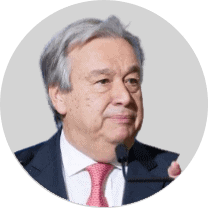
António Guterres
Secretary-General,
United Nations

Angel Gurria
Secretary-General, OECD
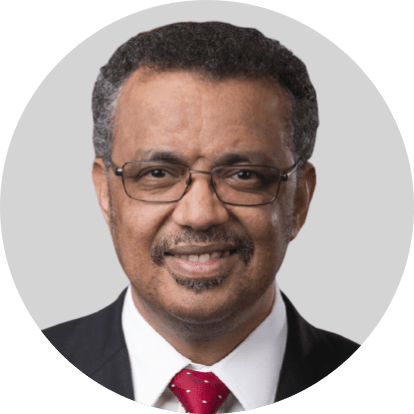
Tedros Adhanom Ghebreyesus
Director General, World Health Organization

Gabriela Ramos
Assistant Director-General for the Social and Human Sciences, UNESCO

Lars-Hendrik Röller
Chief Economic Advisor to Chancellor Merkel,
G7/G20 Sherpa,
German Federal Chancellery

Vera Songwe
Under-Secretary-General of the UN and Executive Secretary of the ECA
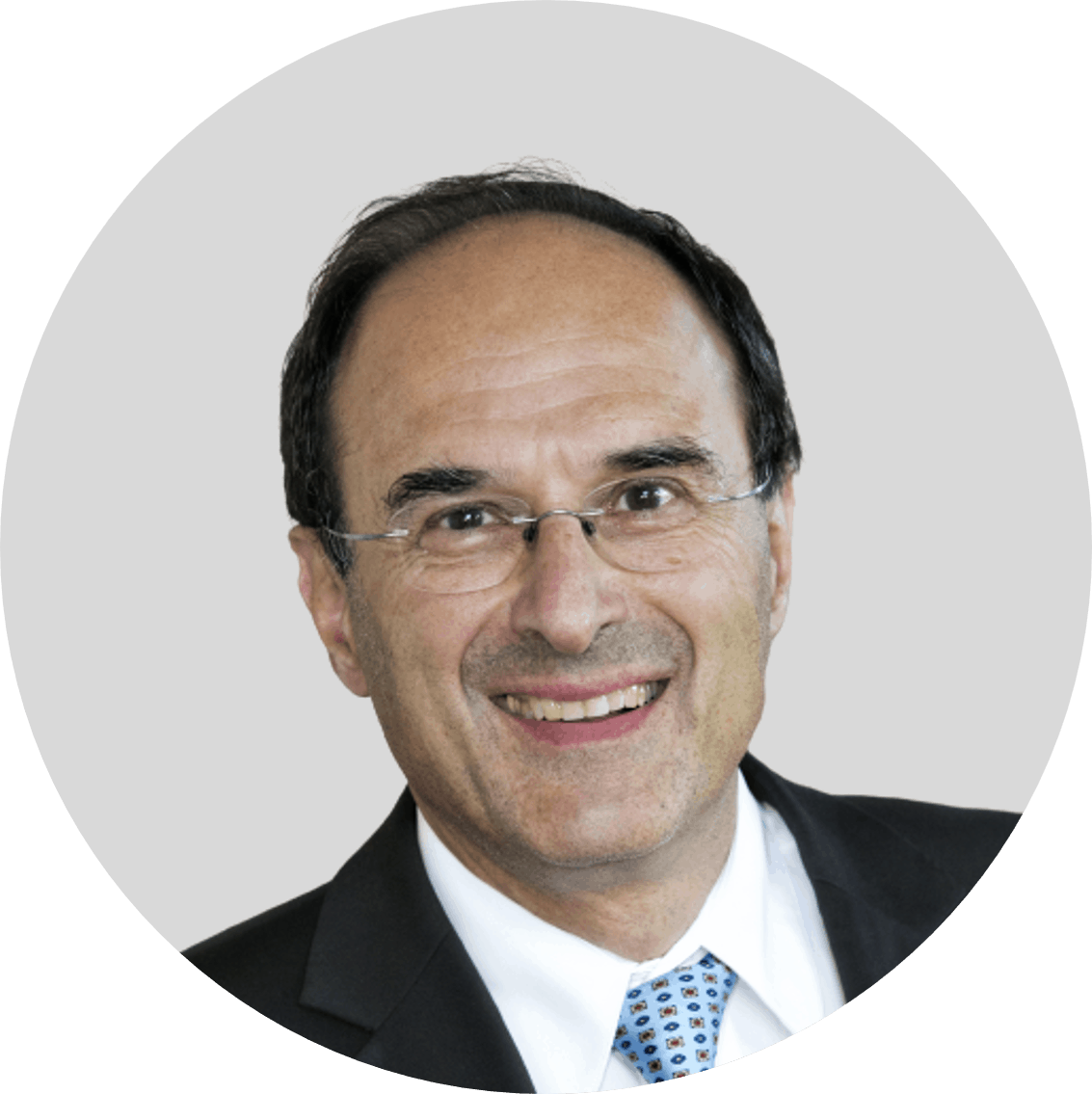
Dennis Snower
President,
Global Solutions Initiative

Robert E. Moritz
Global Chairman, PwC

Sri Mulyani Indrawati
Minister of Finance, Indonesia

Audrey Tang
Digital Minister, Taiwan

Margo Thomas
President & CEO,
Women’s Economic Imperative

Nigel Topping
UN High Level Climate Action Champion, COP26

Francesca Bria
President,
Italian National Innovation Fund
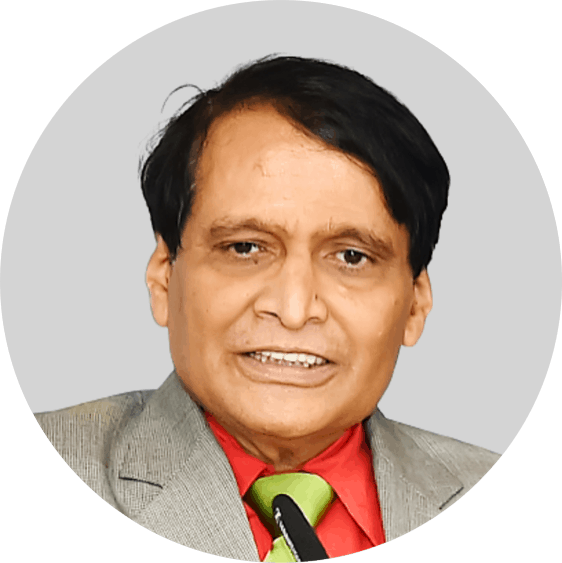
Suresh Prabhu
Prime Minister’s Sherpa for G20 and G7, India
- Press Release: Merkel, Draghi and Guterres call for fair access to Covid-19 vaccines at Global Solutions Summit
- Press Release: Multilateralism is ‘bouncing back:’ Merkel and Draghi call for more global cooperation
- Press Release: UN’s Guterres: Unfair vaccine distribution is ‘totally unacceptable
- Press Release: Taiwan minister shares vision of using digital tools to improve society
- Press Release: Multilateralism is ‘bouncing back:’ Merkel and Draghi call for more global cooperation
- Press Release: Keynote by Angela Merkel, Chancellor of the Federal Republic of Germany (in German Language)
- Press Release: Global Solutions Summit highlights need for fundamental system change in post-Covid world
- Press Release: Central banks are increasingly focused on climate change and call for new economic modelling
- Press Release: Accounting is aligned against climate action and must be overhauled, Global Solutions Summit panelists say
- Press Release: Global Solutions Summit kicks off as ‘rallying cry’ for a Great Realignment
- Fact Sheet: The Global Solutions Initiative and its Annual Summit
- Press Release: Ahead of Global Solutions Summit 2021
- Press Release: Angela Merkel and Mario Draghi to discuss G20 challenges at the Global Solutions Summit 2021


































